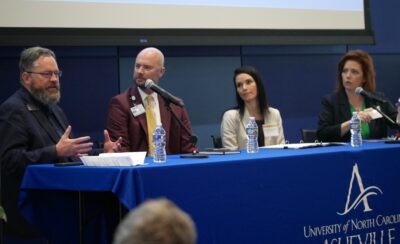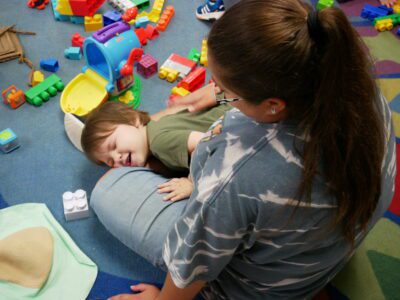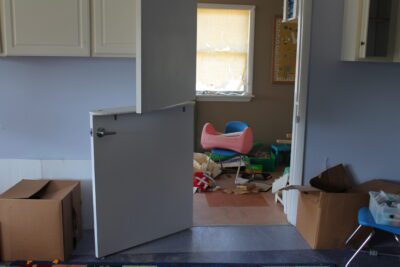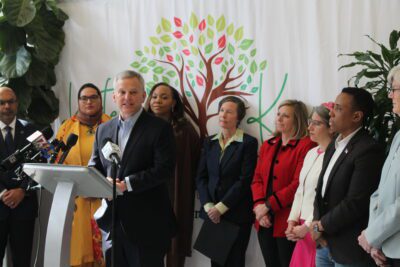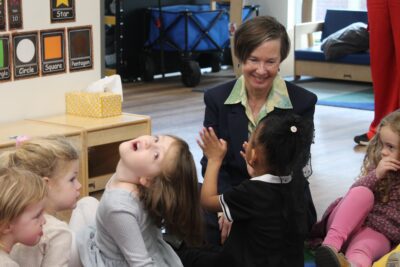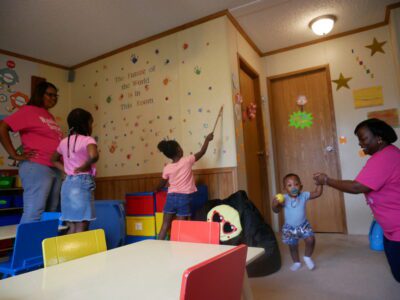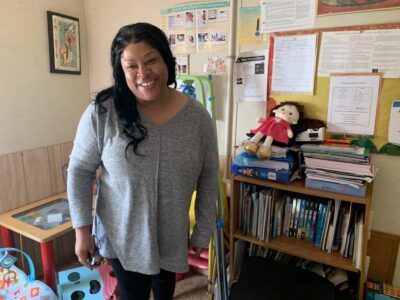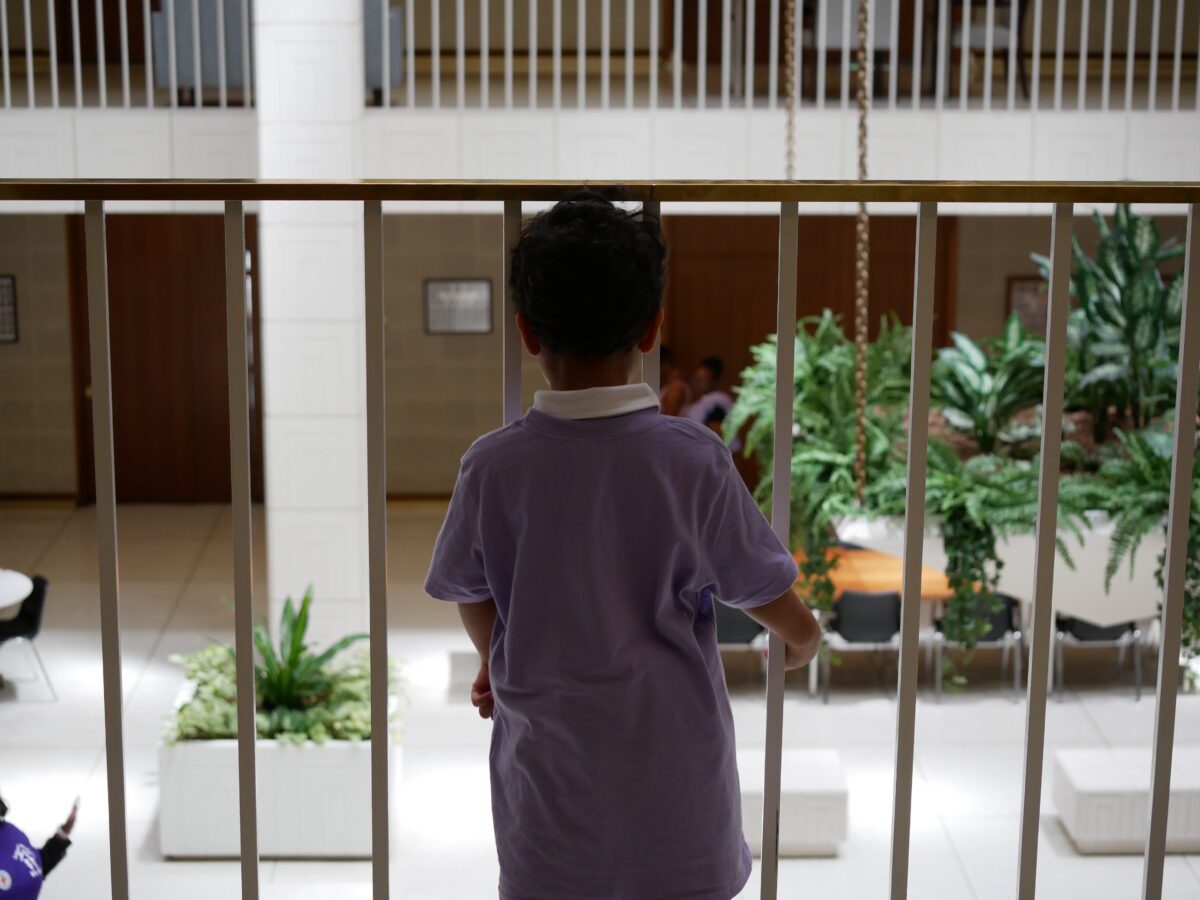
|
|
Contents
- Bolstering child care subsidy and rebuilding after Helene
- Academies to attract more teachers
- Regulatory reforms, studying insurance solutions
- Recognizing family child care
- Child care for child care teachers
- Other bipartisan bills to watch
- Democratic House early childhood bills
- Democratic Senate early childhood bills
Legislators have filed several bills this session that would shape children’s early learning experiences, including more than 30 bills aimed at expanding child care and making that care more affordable for families.
The bills with bipartisan and Republican sponsorship point to this session’s strategies to alleviate such child care challenges as high costs for families, low wages for teachers, and workforce disruptions for businesses.
The bills include investment into the existing child care subsidy system to help families afford care, as well as new models to recruit teachers and reforms to cut costs.
In March the state made the last of its compensation grant payments to child care providers, a program started by the federal government to buoy the system during the pandemic. Experts have warned that this funding cliff probably will lead to lower access and higher tuition. Legislators said last year that a permanent child care solution is needed instead of stopgap funding like the grants.
Next, bills must pass either the House or Senate by May 8 to meet the “crossover” deadline and still have a chance at becoming law. However, legislators often get around that rule by “gutting” bills, or completely changing the contents of surviving bills.
Each chamber also will release budget plans. They’ll then work toward a compromise budget. You can find the education components, including child care policies and investments, in Gov. Josh Stein’s budget plan here.
We will first look at bills with bipartisan or Republican sponsorship, since Republicans have a working supermajority. A list of other bills filed by only Democrats will follow.
Bolstering child care subsidy and rebuilding after Helene
Sen. Ralph Hise, R-Mitchell, is the primary sponsor of Senate Bill 412, the largest proposed child care investment from a Republican legislator so far this session. The bill has bipartisan sponsorship.
The child care subsidy program helps low-income working families afford care. Advocates are calling for an increase in the rates that licensed programs receive to serve children through the program. The current rates cover about half of the cost of care, according to the Division of Child Development and Early Education (DCDEE). They also vary widely from county to county.
Senate Bill 412 would allocate $123.5 million each year to increase rates and provide an additional 10% of funding to programs in rural counties and programs serving infants and toddlers.
“We desperately need to get the rates to at least a somewhat more current level,” said Charles Hodges, executive director of the NC Licensed Child Care Association (NCLCCA), in an interview with EdNC. Infants and toddlers are the most expensive part of the child care business model, Hodges said.
Several early childhood organizations are pushing for a rate floor, which would provide a minimum rate to programs that receive less than the state average.
“This is a step in the right direction, and we want to keep this moving,” said Michael Cooper, director of advocacy at NC Child, one of the groups pushing for the floor rate.
The bill would also give $8 million to rebuild child care in areas impacted by Hurricane Helene. The bill breaks that funding down as follows:
- $1.54 million to the Foothills Regional Commission.
- $1.9 million to the Land of Sky Regional Council.
- $1.39 million to the High Country Council of Governments.
- $1.33 million to the Southwestern Commission Council of Governments.
- $1.84 million to the Western Piedmont Council of Governments.
The recovery effort would include a two-year mentorship program and efforts to support providers through business planning.
Academies to attract more teachers
Legislators are looking to pilot “child care academies,” a model started by local community college and Smart Start leaders to recruit more child care teachers.
The House passed House Bill 389 this week, which tasks the North Carolina Partnership for Children and the NC Community College System to establish a two-year child care academy pilot in 10 counties, plus Johnston and Wayne counties, some of the model’s early adopters.
The academies in the bill would last two to three weeks and provide the trainings, background checks, and knowledge necessary to work as a lead teacher in licensed child care, free of charge.
It has bipartisan backing, with primary sponsors Rep. Dean Arp, R-Union, Rep. Donny Lambeth, R-Forsyth, Rep. John Bell, R-Wayne, and Rep. Larry Strickland, R-Johnston.
The bill includes a $500 stipend for individuals who work in licensed child care for a year after graduation from an academy, and a $150 stipend upon graduation at the discretion of the local Smart Start partnership.
The bill says that the community college system should ensure the appropriate content is included in the academies for the graduates to receive the NC Early Childhood Credential, which is required to be a lead teacher.
“One of the challenges that we have is staffing challenges, and so what this bill attempts to do is open up the pipeline,” Arp said when presenting the bill to the House health committee.
“We are trying to open this up and come at the child care issues from a lot of different ways. Some of them are regulatory changes, some of them are also money, but this is an innovative project based on something that’s working in Johnson County and Wayne County.”
Arp said the model has the potential to create 1,000 new lead teachers, who could serve 8,000 to 10,000 children. Each academy would serve 10 to 15 individuals, the bill says.
Valerie Wallace, executive director of the Partnership for Children of Wayne County, said this model could help vacant classrooms that do not have qualified teachers to fill them. Wallace said more support, like higher compensation and benefits, is needed for teachers to stay and for programs to expand.
“We’ve got empty classrooms, so the slots are already there,” she said. “We just need people to fill them. But then again, we also have child care providers that are quitting every day because the pay is not there.”
The original draft of the bill included $738,000 in nonrecurring funds each year; the latest edition, however, does not include any funding. Arp said in the committee meeting that he took out the funding to move the bill forward and will negotiate the amount during the budget process.
“It’s going to ultimately mean more access for families, the more teachers we have,” Hodges said. He said an NCLCCA board member heard about the model, and the association then advocated for its expansion.
Regulatory reforms, studying insurance solutions
Multiple bills would tweak child care rules and regulations like classroom sizes and teacher requirements.
House Bill 412, passed by the House health committee last week, would redefine “lead teacher” to be responsible for two groups of children instead of one. Lead teachers must hold the NC Early Childhood Credential, while assistant teachers and other employees do not have to hold a credential.
The bill is backed by all Republicans, with primary sponsors Arp, Lambeth, Rep. Erin Paré, R-Wake, and Rep. Heather Rhyne, R-Lincoln. It is scheduled to go in front of the House on April 15.
The bill would make five years of licensed child care experience equivalent to the credential. It also directs the Child Care Commission to create standards for individuals who don’t have credentials to care for infants and toddlers. Those standards, the bill says, must align with federal requirements under the Child Care and Development Block Grant.
It would also increase maximum classroom sizes while maintaining the same child-to-staff ratios.

The bill would create a work group under the Department of Insurance to study options for liability insurance plans for child care providers. Insurance plans for child care businesses have been harder to find and more expensive in recent years, according to a recent report from the NC Chamber of Commerce Foundation.
A survey from the National Association for the Education of Young Children (NAEYC) in August 2024 found that 80% of respondents saw their liability insurance costs increase in the last year and 62% reported difficulty finding or affording it. A third reported being denied or cut off from their insurance in the previous year, and 65% said they would have to close if they could not obtain coverage.
The bill would also create a credential for those caring for school-age children in programs outside of school, like after-school programs. It tasks DCDEE and the community college system to create the credential that aligns with a new curriculum course and a continuing education course.
Senate Bill 745, with bipartisan primary sponsors Sen. Jay Chaudhuri, D-Wake, and Sen. Jim Burgin, R-Harnett, would make the same group size changes. Senate Bill 528, sponsored by Burgin, Sen. Amy Galey, R-Alamance, and Sen. Kevin Corbin, R-Cherokee, has many of the same regulatory changes. It was approved by the Senate health care committee this week.
Both leave out certain components of House Bill 412. They do not include the redefinition of a lead teacher or the new infant/toddler teacher standards. They also leave out a section that would direct DCDEE to create a plan to stop basing the rates providers receive to participate in the subsidy program on a program’s quality rating. When a similar proposal came up during last year’s session, providers were concerned it would disincentivize programs from improving quality in the QRIS (Quality Rating and Improvement System) and lead to overall less subsidy funding for most providers.
Recognizing family child care
House Bill 412 would also begin to award credentials to family child care providers based on continuing education courses they take at community colleges. It would give an administrator or family child care credential to individuals who have completed courses that community colleges determine contain the appropriate content.
This would be a step toward acknowledging the variety of roles that family child care providers play, said Courtney Alexander, director of the NC Home Based Child Care Initiative at the nonprofit MDC.
Family child care providers are often the owner, director, and sole teacher for their program, as well as the cook, janitor, administrative manager, and driver.
House Bill 309, which has Republican-only sponsorship, establishes a classification for family child care homes in the state building code. The bill has been approved by House judiciary and housing committees and is on the calendar for the House floor on April 15.
The changes in the bill would alleviate some of the barriers providers face in navigating local ordinances, as well as costs associated with a commercial building classification, Alexander said. Some providers were having difficulty enrolling the full number of children allowed by the state because of local rules and classifications.
She said providers, through MDC’s family child care “communities of practice,” then advocated for this change.
“We need to, as a state, recognize why families are choosing home-based child care, and how important it is to the ecosystem of child care and our workforce and our future,” Alexander said.
Child care for child care teachers
House Bill 800 would create a pilot to help child care teachers afford care for their own children.
The bill, which has bipartisan support, would allocate $10 million for a two-year pilot in counties chosen by DCDEE that have lost a high percentage of child care capacity in the last decade. For child care teachers working at licensed facilities for at least 35 hours per week, it would grant automatic eligibility for the child care subsidy program, regardless of income. It would prohibit centers from charging teachers copayments or other fees.
Several states have passed similar pieces of legislation after Kentucky pioneered the model in 2022 as a teacher recruitment and retention tool.
Those receiving the funds would be required to enroll in introductory early childhood courses at a community college and commit to completing certain early childhood certificates within 18 months. Those courses would be free for the teacher and paid for through the TEACH Early Childhood Scholarship program from the nonprofit Early Years, formerly known as the Child Care Services Association.
The bill also directs DCDEE to study the effectiveness of early childhood models like NC Pre-K and Smart Start. It says the division must look at other early childhood models that might be more effective, and directs the division to ensure that all funded NC Pre-K slots are filled. It says DCDEE should also study subsidy rates to identify a minimum rate in order to establish a subsidy floor.
The bill also requires funds for Tri-Share and a family child care expansion project, pilots created by the state in the last two years, to be approved by the legislature before being further spent.
Other bipartisan bills to watch
House Bill 542 would send $7.5 million each year to the North Carolina Partnership for Children for mental and behavioral health services for children, educators, and families in child care settings. NCPC would then disburse the funds to local Smart Start partnerships, which provide a range of support services to child care programs and families.
House Bill 877 would allocate a one-time $5 million to create a public-private partnership to build a child care facility. The bill says the state would provide the land and “shell building” to a third-party private child care operator, chosen through an RFP process, to cut down on costs of building a new facility. It would require the operator to pay at least $13 per hour to educators, provide health insurance, and cap parent tuition.
House Bill 947 directs the State Board of Education and local boards of education to create a dyslexia screening, assessment, and intervention for public school students. It also directs the Department of Public Instruction (DPI) to oversee dyslexia screening for students and training for teachers in NC Pre-K, the state’s public preschool for at-risk 4-year-olds. It would also move NC Pre-K from the Department of Health and Human Services to DPI. NC Pre-K classrooms are housed in both public schools and private child care programs.
Senate Bill 98 would allocate $1.5 million each year to Dolly Parton’s Imagination Library, a program that sends free books to children each month. The funding would go to NCPC, which administers the program.
Senate Bill 463 would allocate $1 million each year to include certain doula services through the state’s Medicaid program. This would draw down $1.8 million in federal funding. The bill would also create required credentialing for doulas to participate in Medicaid and allocate $550,000 each year to provide technical assistance to the doula workforce.
Democratic House early childhood bills
HB809: Count NC Pre-K for School ADM.
HB952: Comprehensive Capital for Childcare Expansion.
HB951: SOS (State Owned Structures) Child Care Act.
HB651: Reduce Parent Copays/Child Care Subsidy/Funds.
HB420: Sound Basic Education for Every Child.
HB398: Enact KinCare & Safe Days.
HB208: Partnership for Children Information Access.
HB115: Child Care Facility Tax Exemption.
Democratic Senate early childhood bills
SB712: Caring for Our Caregivers Act.
SB692: Reduce Parent Copays/Subsidized Child Care.
SB641: Reenact Child Tax Credit.
SB680: Comprehensive Capital for Childcare Expansion.
SB678: Onsite Childcare for State Employees Act.
SB677: SOS (State Owned Structures) Childcare Act.
SB618: Lasting Economic and Academic Prosperity Act.
SB594: Care Center Cost Support Act. Latest Version
SB592: Statewide Child Care Investment Act.
SB593: Grant Our Kids Care Act.
SB483: The Children First Act.



